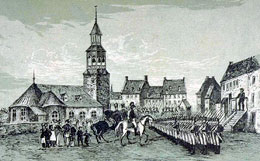Date: March 15, 1775.
“Messrs. James Price and Alexander Hay, at Montreal.
Gentlemen, -So handsome a donation as £100. 4s., accompanied by such an animating letter from our brethren at Montreal, cannot fall to excite the warmest gratitude in the breast of every one who wishes prosperity and freedom to his country. The committee to whom your letter comes directed beg leave (as well on their account as in the name and behalf of every virtuous man in the town, more especially of the many thousands who are actually feeling the miseries occasioned by the Boston Port Bill) to offer you their most unfeigned thanks for this convincing proof of your sympathy for the distresses of your fellow-countrymen, and for your firm, disinterested attachment to the rights of your country. It affords singular pleasure td every friend of virtue to find such enlarged and generous sentiments as dictated your letter discovering themselves in places where the utmost diligence and most wicked devices have been made use of to distinguish them. The religion lately established in Canada is but too well calculated to banish every idea of freedom, and to familiarize the mind to slavery. But your letter is an agreeable instance how tenacious men are of their rights when they clearly understand them. We wish most heartily that sentiments like yours may be diffused throughout your widely-extended province, to the utter extinction of every imposition, whether civil or religious. Your numbers are great, and it is of course important to us whether you are engaged for or against us. The decision of the present controversy between Britain and the colonies will give happiness or misery to America for years, perhaps for centuries. Unanimity and firmness form the only anchor on which we depend. And we have the strongest assurances that can be given, that the whole continent see with the same eyes, and are actuated by one soul. To war with brethren must be shocking to every brave, every humane mind; but, if brethren and fellow-subjects will suffer themselves to be instruments in the hands of tyrants to stab our Constitution, every tender idea must be forgot, and they must be repelled with that heroic spirit which open enemies have experienced.
Our advocates are many, both in Europe and America; but the importance of our prosperity makes it a duty to solicit with earnestness for all the assistance and all the strength which the continent can give.
The inhabitants of Montreal have done worthily. May Heaven reward them! and, while life lasts, the memory of their kindness will never be effaced from the bosoms of the committee of donations.
Joseph Warren, per order.”
Sources: Richard Frothingham, The Life and Times of Joseph Warren, Boston: Little, Brown & Co., 1865, pp. 442-443. Also published in Massachusetts Historical Society Proceedings, IVth Series, iv, p. 237. The image is an old engraving depicting General Guy Carleton reviewing British troops at the Place d’Armes in Montreal during the period of the American invasion of Canada in 1775. Image credit: BAnQ Fonds Massicotte, Call no. 4-63a-a.
Commentary: Frothingham speculated that James Price and Alexander Hay represented a Committee of Correspondence in Montreal. Joseph Warren was acknowledging a generous donation of £100/4 toward the relief of Boston, then suffering deprivations under the Boston Port Bill. The extent of support for the Patriot cause in Canada later proved not to be as widespread as American leaders had hoped. An American incursion into Canada and Siege of Quebec in late 1775 and the early months of 1776 failed to foment rebellion among Canadians and was defeated by the British Army under General Guy Carleton.

 Follow
Follow